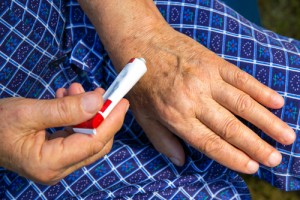 It is estimated that roughly 5% of all newly diagnosed cancers in America are melanomas — a tumor of melanin-forming cells, and ranked as the most serious type of skin cancer. This year alone, the National Cancer Institute is foreseeing 76,100 new cases of melanoma, and about 9,710 mortalities.
It is estimated that roughly 5% of all newly diagnosed cancers in America are melanomas — a tumor of melanin-forming cells, and ranked as the most serious type of skin cancer. This year alone, the National Cancer Institute is foreseeing 76,100 new cases of melanoma, and about 9,710 mortalities.
Melanoma patients received good news today, as the US Food and Drug Administration put Merck & Co.‘s Keytruda (pembrolizumab) on the fast track for approval. Indicated for advanced stage, unresectable, and unresponsive melanoma cases, this drug is the first to have the ability to block a specific cellular pathway that prevents the immune system from targeting these cancer cells.
The FDA’s primary reason for granting the product accelerated approval is because of its impressive performance in preliminary studies, producing significantly better results when compared to the other melanoma treatments on the market today. This accelerated status will allow patients to have access to the treatment sooner, while more confirmatory clinical trials are underway. Keytruda was also granted priority review and orphan product designation.
The director of the FDA’s Center for Drug Evaluation and Research’s Office of Hematology and Oncology Products, Dr. Richard Pazdur, shared that this breakthrough drug is the product of immeasurable research efforts and is only the 6th approved treatment for melanoma since 2011.
One of the drug’s clinical trials involved the participation of 173 patients with an advanced stage of melanoma, whose cancer worsened even after other treatments. Keytruda was administered in varying doses to each participant, and yielded significant findings: Of those who received the drug’s recommended dose of 2mg/kg, about 24% were noted to have tumor shrinkage that lasted 1.4-8.5 months. The same trend was observed in participants who received the 10mg/kg dose.
A trial that involved 411 patients with advanced melanoma demonstrated the drug’s safety. Some of its usual side effects are fatigue, cough, nausea, itchy skin (pruritus), rash, decreased appetite, constipation, joint pain (arthralgia) and diarrhea. As to severe adverse effects, immune-mediated reactions within the lungs, colon, endocrine system, and liver were rare.
In other advancements for cancer care, a group of scientists from the Cockrell School of Engineering at UT Austin created a diagnostic probe that has the potential to replace skin biopsies, and help save more health dollars.


